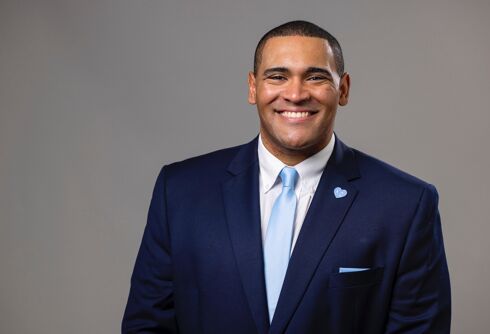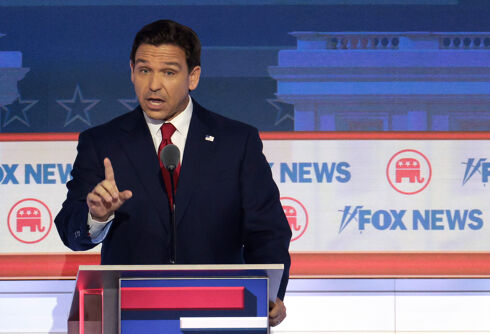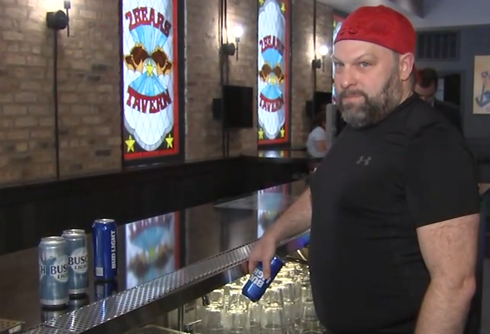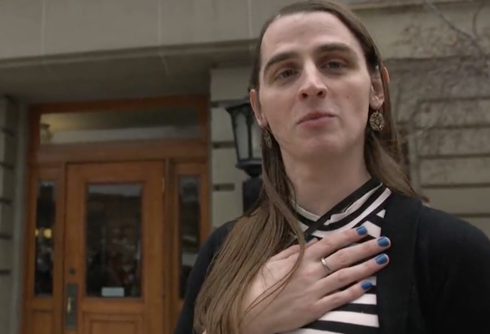Conservatives, fueled by a base that has long included hard right Christian evangelicals, have pivoted since their loss over Obergefell v. Hodges. No longer able to scaremonger over same-sex marriage like a decade ago, their new “wedge issue” is transgender people.
This election season has seen the issue of transgender rights come up more and more in recent weeks, as the Trump Administration has attempted to erase transgender civil rights on the federal level.
We’ve also seen a record number of transgender candidates run for office, as well as a contentious referendum on transgender rights in Massachusetts.
With this in mind, here are four of the big arguments being used by the right against transgender rights this election season — and why they’re wrong.
Never Miss a Beat
Subscribe to our newsletter to stay ahead of the latest LGBTQ+ political news and insights.
1. Transgender people aren’t “real” or “valid”
This is an argument as old as they come. The attitude is that transgender people are either pretending to be transgender, or are delusional, and therefore not deserving of rights or protections.
We know that while transgender people have become more prevalent in society over the last few decades, people have identified in ways consistent with what we would today refer to as “transgender” throughout recorded history.
Related: Activists unfurled a gigantic trans flag on the steps of the Lincoln Memorial
What’s more, science has overwhelmingly shown that transgender identities are valid and consistent, so when you see this argument used by conservatives during this election season, know that it’s more a sign of their own bias than anything about the reality of transgender identity.
2. Letting transgender people into restrooms will make people less safe
The argument is this: letting transgender people use the facilities that fit their gender identity will allow sexual predators into the bathroom. It’s the basis of this advertisement in this year’s fight over Question 3 in Massachusetts
These arguments are nothing new, and are highly deceptive.
Note that the predator in the ad is not attempting to present as female in any way: there is not attempt to show this person as transgender, and is trying to argue that any male could enter a restroom under the cover of this law. That is untrue.
A sexual predator attempting to do what this commercial claims would find it easier to put on a janitor’s jumpsuit and walk in the bathroom to “clean” it versus attempting to claim they’re transgender.
This also fails to note is that such a law will not repeal any laws surrounding rape or sexual assault.
3. Letting transgender people into restroom would violate your privacy and expose your children
This is somewhat similar to the last, but instead of it being the “slippery slope” of trans rights allowing sexual predators to enter restrooms and changing facilities, this one aims squarely at transgender people themselves.
Once again, it’s the fight in Massachusetts, and this No on 3 advertisement that illustrate the argument.
This argument fails to note that this law doesn’t change the issue of privacy at all. No one is suggesting the doors be removed from the stalls in a restroom with these laws, and the same expectations remain in place.
What’s more, transgender people already use facilities appropriate to their gender, and have since gendered public toilets became common. In the fight in Massachusetts this is even truer: the ballot initiative would repeal existing protections; no one has reported any major issues with the status quo in the state.
4. Accepting transgender people violates a person’s religious freedom
This is at the heart of the Religious Freedom Task Force that Attorney General Jeff Sessions announced at the end of July, and is an issue coming up more and more, and one that goes beyond transgender people. It’s at the heart of the “wedding cake” battle, but with a trans twist.
In short, this argument is that accepting a transgender person’s gender identity would violate another person’s rights to express bigotry based on their religious beliefs.
Related: Suicide hotline calls quadrupled after Trump’s latest attack on transgender people
Of course, religious freedom is a large part of American life. The First Amendment guarantees a right of free exercise and free expression for all religious beliefs, and there are two centuries worth of case law that supports religious liberty for all sorts of beliefs.
This is a new form of “religious liberty,” however, and it is still unsettled if “religious freedom” allows one to express bigotry. Historically, it hasn’t, but this is Trump’s America and he’s stacked the courts with far right evangelical Christian extremists.
In each case, the arguments don’t hold up under scrutiny. No one is losing rights by letting transgender people thrive. No one loses their right to have a faith, no one loses privacy, and no one need fear transgender rights causing an increase in predators.
What’s more, transgender do exist and their feelings are valid — which skewers these arguments wholly.






















































































































































































































































































































